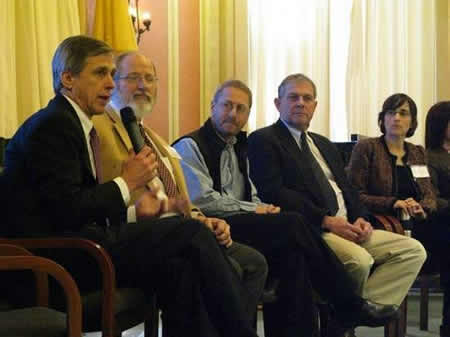Image: Kirk Moore for New Jersey Press Media | Courier Post
The real Jersey shore, that is.
Leaders from business and industry, state and local government officials, academics and non-profit organizations recently gathered at Monmouth University to discuss, “Building a Sustainable Future For New Jersey’s Coastal and Ocean Economy” for which Dodge’s President and CEO Chris Daggett was the keynote speaker.
Chris, who is a former Department of Environmental Protection (DEP) Commissioner and Environmental Protection Agency (EPA) Region II Administrator told the audience that “the next 30 years may bring the most significant changes to the coastal ocean since industrialization in the 19th century.”
In New Jersey, the economy and the environment are more inextricably linked in our coastal and ocean sectors than anywhere else in the state. According to U.S. Ocean and Coastal Economies (2009), New Jersey’s direct ocean economy:
• Generated $4.7 billion or 1.1% of the state’s Gross Domestic Product (GDP).
• Provided $2.8 billion in wages and salaries.
• Provided 88,457 jobs – 66% of which were in coastal tourism & recreation.
Balancing development, economic growth and the unique environmental needs in these areas is tricky. “The stress of shrinking state and federal government budgets can drive many to lose sight of the long view about the [water] infrastructure that is so critical to the state’s environmental and economic health,” Chris noted. In turn, we must “create the space and trust to conduct the difficult conversations around power, privilege, access, opportunity, justice, and the broader notion of ‘progress.'”
The philanthropic sector is well-positioned, he suggested, to play a leadership role as a neutral convener of all stakeholders, in order to establish a climate of civil, solutions-oriented discourse.
We asked Dodge grantee Tim Dillingham, who is the Executive Director of the American Littoral Society to give us his thoughts on the conference. He told us that “the fact that the business community participants started their comments with a recognition and acknowledgement of the importance of a clean and healthy coastal environment to their profitability was significant.”
He continuted, “Too often, the views of the business sector have been framed as the economy versus the environment. If we start the conversation about the challenges of building a sustainable coastal economy in agreement about the need for a healthy environment, we can get further down the road of finding answers to pressing issues, both economic and environmental. It offers the opportunity to frame the discussion differently – and the potential to break out of the historic logjams and conflicts over these questions. Most importantly, it strengthens our chances of finding answers that work. A new starting point in the conversation will generate new collaborations, tapping the creativity of both the conservation and business communities.”
For a write up of the event, see this article from the Courier Post
You can also read Chris’ complete keynote talk here.

